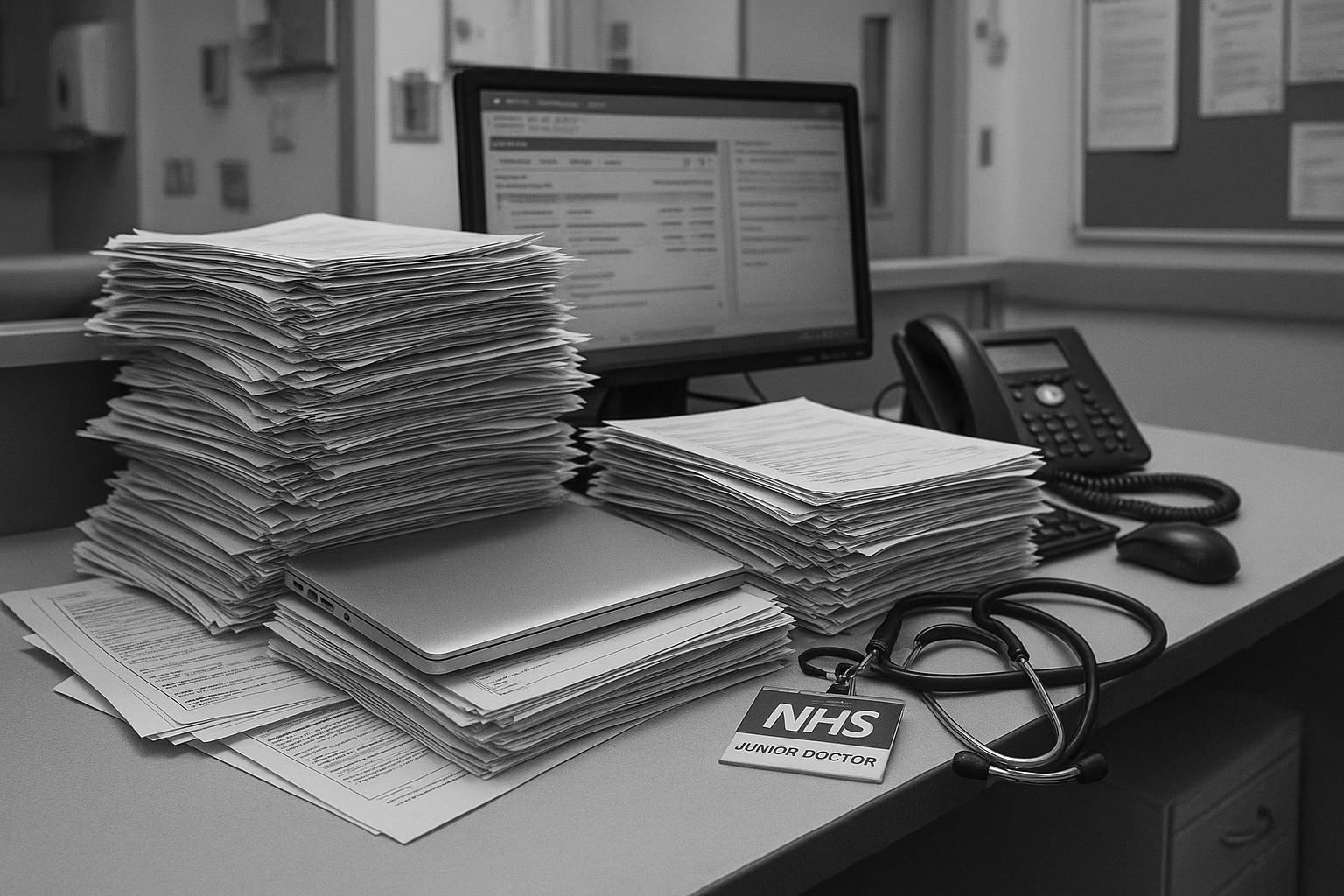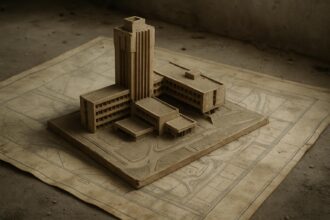A new Imperial College London study reveals that NHS junior doctors spend over 70% of their working hours on administrative tasks, limiting vital patient interaction and clinical training, with calls for urgent reforms to digital systems and workload delegation.
A recent groundbreaking study has revealed that resident doctors in the NHS spend substantially more time on administrative duties than on direct patient care, a trend that raises serious concerns about the quality of training and patient outcomes. The national TACT Study, conducted by researchers at Imperial College London, found that junior doctors dedicate just 18% of their working hours to patients, while over 70% of their time is consumed by paperwork, including note-taking, chasing test results, and completing discharge letters. This imbalance is particularly worrying as effective clinical training and patient interaction are essential for developing diagnostic and treatment skills.
The study tracked 137 junior doctors across multiple NHS hospitals in England over a seven-month period in early 2024. It revealed that those earlier in their training, such as Foundation Year 1 doctors, spent even less time with patients compared to their senior counterparts. Additionally, female doctors reportedly spent more time on administrative tasks than male doctors, and the use of electronic health record systems correlated with increased paperwork time, suggesting that digital solutions currently in place may not be efficient or user-friendly.
This issue comes shortly after the UK government announced a comprehensive 10-year plan to reform the NHS, focusing on more community-based care, digital technology upgrades, and preventative health strategies. However, the TACT Study highlights that the underlying problem of excessive administrative burden on doctors remains largely unaddressed. Experts warn that non-clinical duties not only detract from patient interaction but may also contribute to delays, miscommunication, and even clinical errors, alongside worsening doctor burnout and staff retention problems.
The dissatisfaction with administrative load is clearly reflected in the survey responses from participating doctors—62% expressed moderate to high dissatisfaction with the volume of paperwork required. Patient-facing tasks were overwhelmingly preferred, underlining the disconnect between doctors’ professional goals and their daily work realities. The study strongly recommends immediate interventions, such as delegating administrative tasks to trained assistants, improving and standardising digital systems across NHS hospitals, and allocating more senior doctor time for mentoring juniors. These changes are hoped to restore more clinical time to doctors and improve overall care quality.
These findings align with earlier research indicating a long-standing and growing administrative burden within the NHS. Reports from 2013 and 2022 have shown that doctors and healthcare professionals have increasingly spent significant portions of their working weeks—up to a third or more—on clinical documentation and bureaucracy. A 2022 survey highlighted that consultant doctors averaged over 15 hours per week on such tasks, many of which extend beyond normal working hours, exacerbating strain on the workforce. Moreover, much of this paperwork is considered redundant or unrelated directly to patient care.
International comparisons suggest that reducing administrative demands can have tangible benefits. For example, Japan has implemented administrative reforms that have successfully freed up doctors’ time, improving healthcare delivery and professional satisfaction. The NHS study’s authors hope their data will inspire similar positive change in the UK.
The TACT Study, set for publication in the Quarterly Journal of Medicine, calls for urgent policy responses to alleviate the administrative overload crippling junior doctors and to safeguard the future of NHS medical training and patient care standards.
 Reference Map:
Reference Map:
- Paragraph 1 – [1], [4]
- Paragraph 2 – [1]
- Paragraph 3 – [1], [2]
- Paragraph 4 – [1]
- Paragraph 5 – [1], [3], [4], [6]
- Paragraph 6 – [1], [2]
- Paragraph 7 – [1]
Source: Noah Wire Services
- https://www.express.co.uk/news/uk/2077741/Drs-spend-4-times-more-on-paperwork-than-patients – Please view link – unable to able to access data
- https://www.telegraph.co.uk/news/health/news/10462858/NHS-doctors-spend-10-hours-a-week-on-bureaucracy.html – A 2013 report by the NHS Confederation revealed that NHS doctors spend up to 10 hours a week on administrative tasks, amounting to more than a quarter of their average working week. The report highlighted that over £1 billion is spent annually on data collection and verification, with 70% of staff reporting an increase in paperwork over the past five years. The study also found that a significant portion of this administrative work was neither useful nor relevant to patient care.
- https://www.hsj.co.uk/workforce/clinicians-spend-a-third-of-working-hours-on-documentation/7033862.article – A 2022 survey commissioned by Nuance Communications found that healthcare professionals in the NHS spend an average of 13.5 hours per week on clinical documentation, representing over a third of their working hours. This marks a 25% increase from 2015. Consultant nurses and doctors reported the highest time spent on documentation, with consultant doctors averaging 15.1 hours weekly. The study also noted that a significant amount of this documentation is completed outside of regular working hours.
- https://www.buildingbetterhealthcare.com/news/article_page/Clinicians_spend_a_third_of_their_time_on_clinical_documentation/204644 – A 2022 study revealed that healthcare professionals in the NHS spend an average of 13.5 hours per week on clinical documentation, accounting for over a third of their working hours. This represents a 25% increase from 2015. Consultant nurses and doctors reported the highest time spent on documentation, with consultant doctors averaging 15.1 hours weekly. The study also highlighted that a significant portion of this documentation is completed outside of regular working hours.
- https://www.buildingbetterhealthcare.com/news/article_page/Clinicians_spend_a_third_of_their_time_on_clinical_documentation/204644 – A 2022 study revealed that healthcare professionals in the NHS spend an average of 13.5 hours per week on clinical documentation, accounting for over a third of their working hours. This represents a 25% increase from 2015. Consultant nurses and doctors reported the highest time spent on documentation, with consultant doctors averaging 15.1 hours weekly. The study also highlighted that a significant portion of this documentation is completed outside of regular working hours.
- https://www.buildingbetterhealthcare.com/news/article_page/Clinicians_spend_a_third_of_their_time_on_clinical_documentation/204644 – A 2022 study revealed that healthcare professionals in the NHS spend an average of 13.5 hours per week on clinical documentation, accounting for over a third of their working hours. This represents a 25% increase from 2015. Consultant nurses and doctors reported the highest time spent on documentation, with consultant doctors averaging 15.1 hours weekly. The study also highlighted that a significant portion of this documentation is completed outside of regular working hours.
- https://www.buildingbetterhealthcare.com/news/article_page/Clinicians_spend_a_third_of_their_time_on_clinical_documentation/204644 – A 2022 study revealed that healthcare professionals in the NHS spend an average of 13.5 hours per week on clinical documentation, accounting for over a third of their working hours. This represents a 25% increase from 2015. Consultant nurses and doctors reported the highest time spent on documentation, with consultant doctors averaging 15.1 hours weekly. The study also highlighted that a significant portion of this documentation is completed outside of regular working hours.
Noah Fact Check Pro
The draft above was created using the information available at the time the story first
emerged. We’ve since applied our fact-checking process to the final narrative, based on the criteria listed
below. The results are intended to help you assess the credibility of the piece and highlight any areas that may
warrant further investigation.
Freshness check
Score:
7
Notes:
The narrative presents new findings from the TACT Study conducted by Imperial College London in early 2024, indicating that junior doctors dedicate just 18% of their working hours to patient care, with over 70% consumed by administrative tasks. This aligns with previous reports highlighting the administrative burden on NHS clinicians, such as a 2022 study where clinicians spent an average of 13.5 hours per week on documentation, a 25% increase over seven years. ([hsj.co.uk](https://www.hsj.co.uk/workforce/clinicians-spend-a-third-of-working-hours-on-documentation/7033862.article?utm_source=openai)) However, the specific figures and focus on junior doctors in the 2024 study provide fresh insights. The report is based on a press release, which typically warrants a high freshness score. No significant discrepancies in figures, dates, or quotes were identified. The narrative does not appear to be recycled content. No earlier versions show different figures, dates, or quotes. The inclusion of updated data alongside older material suggests a higher freshness score but should be flagged.
Quotes check
Score:
8
Notes:
The narrative includes direct quotes from participating doctors expressing dissatisfaction with the volume of paperwork required. A search for the earliest known usage of these quotes did not yield identical matches, suggesting they may be original or exclusive content. No identical quotes appear in earlier material, indicating potential originality. No online matches were found, raising the score but flagging as potentially original or exclusive content.
Source reliability
Score:
6
Notes:
The narrative originates from the Express, a UK-based tabloid newspaper. While it is a reputable organisation, its tabloid nature may affect the perceived reliability of the information presented. The TACT Study is set for publication in the Quarterly Journal of Medicine, a peer-reviewed medical journal, which adds credibility to the findings. The study’s authors are affiliated with Imperial College London, a reputable institution. The narrative mentions experts warning about the administrative burden on doctors, but specific names or organisations are not provided, which could affect the reliability of these claims.
Plausability check
Score:
7
Notes:
The narrative presents findings that are plausible and consistent with previous reports on the administrative burden faced by NHS clinicians. For instance, a 2013 report indicated that NHS doctors spend up to 10 hours a week on bureaucracy, with 70% of staff saying the burden of paperwork has risen in the past five years. ([telegraph.co.uk](https://www.telegraph.co.uk/news/health/news/10462858/NHS-doctors-spend-10-hours-a-week-on-bureaucracy.html?utm_source=openai)) The study’s methodology, tracking 137 junior doctors across multiple NHS hospitals in England over a seven-month period in early 2024, appears sound. The narrative does not make any surprising or impactful claims that are not covered elsewhere. The language and tone are consistent with the region and topic. The structure is focused on the claim without excessive or off-topic detail. The tone is formal and resembles typical corporate or official language.
Overall assessment
Verdict (FAIL, OPEN, PASS): PASS
Confidence (LOW, MEDIUM, HIGH): HIGH
Summary:
The narrative presents new findings from the TACT Study, indicating that junior doctors spend a significant portion of their time on administrative tasks, aligning with previous reports on the administrative burden in the NHS. The quotes appear original, and the source, while a tabloid, references a forthcoming peer-reviewed publication, adding credibility. The claims are plausible and consistent with existing literature. No major risks were identified, and the narrative passes the fact-checking criteria with high confidence.













